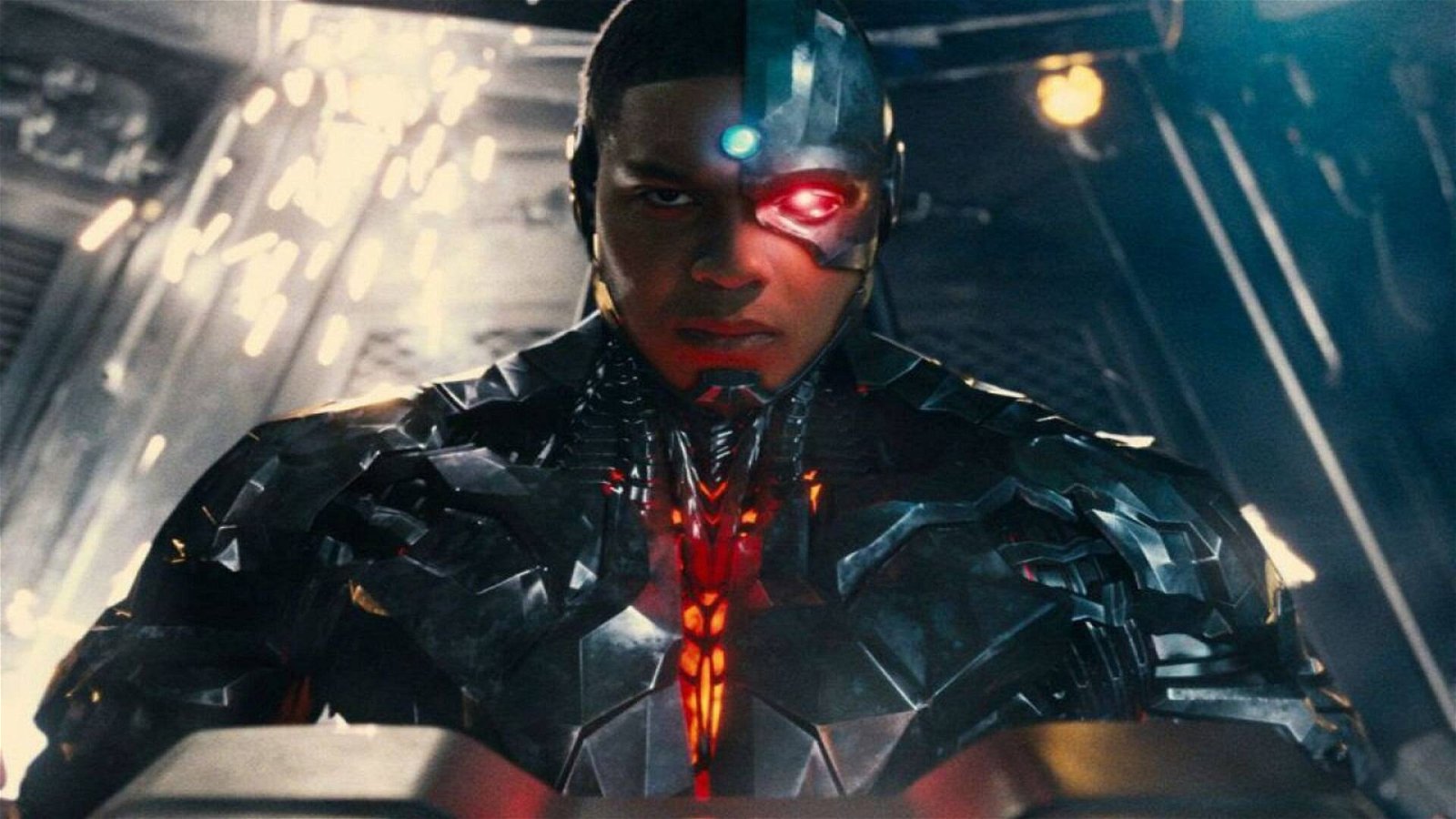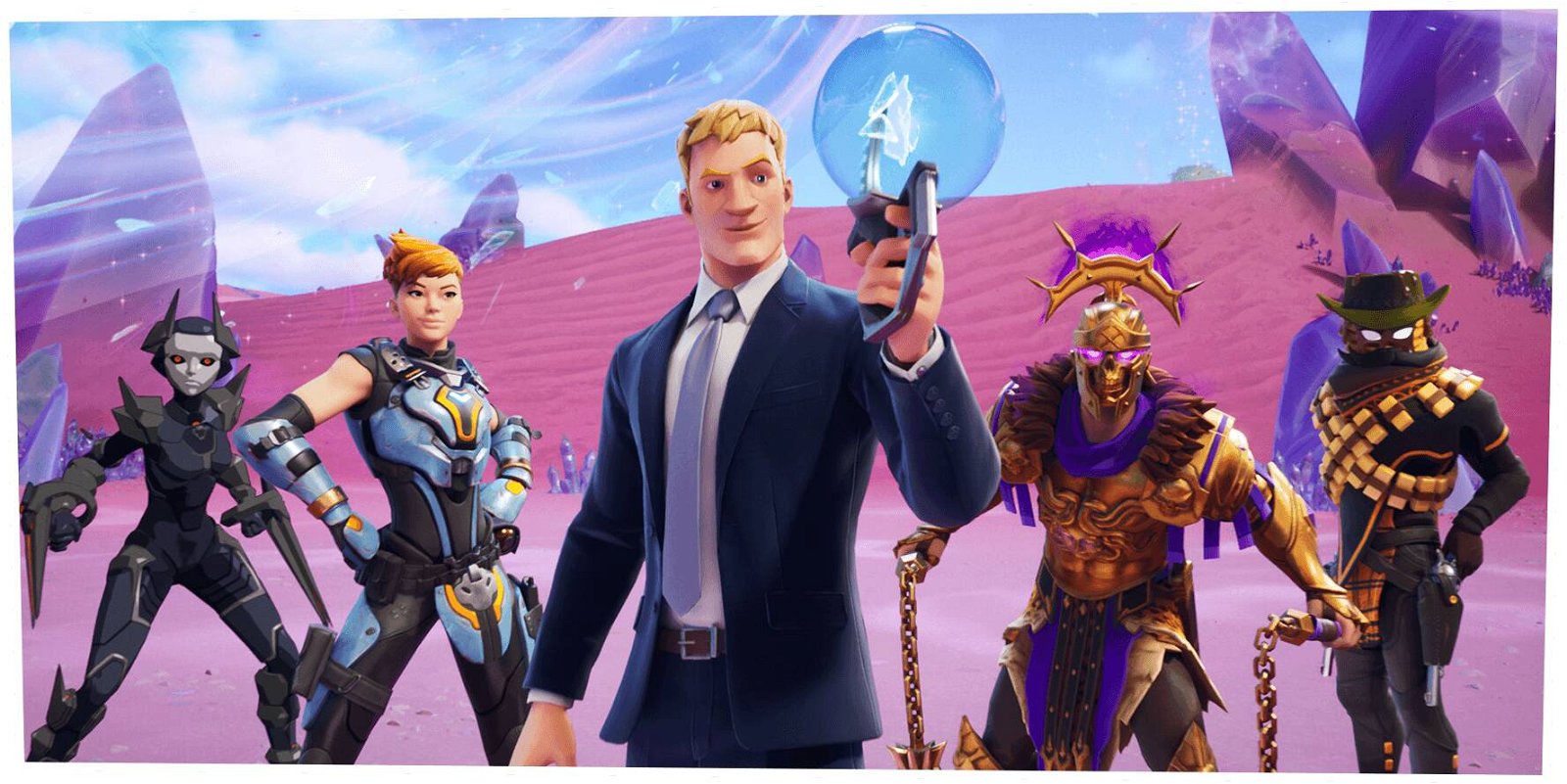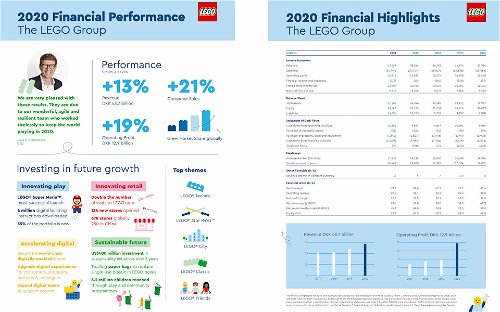Il Gruppo LEGO ha pubblicato lo scorso 10 marzo il proprio rapporto finanziario annuale 2020, dal quale è emerso che nonostante la pandemia COVID-19, l'azienda ha chiuso il 2020 con numeri di tutto rispetto. Le vendite al consumo sono aumentate del 21% rispetto al 2019, dimostrando che il Gruppo LEGO non solo è forse una delle aziende più resilienti al mondo, ma che è anche stata in grado di prosperare nel mezzo di una crisi sanitaria globale.
Dal 2017, il Gruppo LEGO è riuscito a invertire il trend negativo dei dati di vendita, riportandoli verso un trend di crescita crescente, raggiungendo il picco più alto da allora proprio nel 2020 appena chiuso.
Vediamo insieme quali sono stati i punti salienti della rapporto finanziario annuale 2020 del Gruppo LEGO.
- Le entrate sono aumentate del 13%;
- Le vendite sono salite del 20%;
- Il tema LEGO Super Mario è stato il lancio di maggior successo del 2020, con fino a 6 milioni di istruzioni digitali scaricate;
- Il numero totale dei negozi (LEGO Brand Store e LEGO Certified Store) è arrivato a 678 negozi in tutto il mondo, dei quali 134 aggiunti solo nel 2020;
- I primi 5 temi LEGO più venduti nel 2020 sono stati: LEGO Technic, LEGO Star Wars, LEGO City, LEGO Classic e LEGO Friends;
- Il processo di sostituzione delle buste di plastica monouso posti all'interno dei set con con buste di carta FSC è stato avviato;
Il dato più impressionante resta comunque il fatto di come il Gruppo LEGO sia riuscito ad affrontare e a superare la sfida della pandemia, trasformando una situazione apparentemente problematica in un'opportunità che beneficia non solo l'Azienda ma anche i fan.
Niels B. Christiansen, il CEO di Gruppo LEGO ha dichiarato:
"Siamo molto soddisfatti di questi risultati. Dimostrano la rilevanza senza tempo del mattoncino LEGO e dell'apprendimento attraverso il gioco. Questa performance è anche una testimonianza della passione, della creatività e della resilienza della nostra gente. Nonostante le sfide della pandemia, hanno lavorato instancabilmente per continuare a far giocare il mondo"
Vi riportiamo qui di seguito il comunicato stampa completo (in inglese):
BILLUND, March 10, 2021: The LEGO Group today reported earnings for the full year 2020. Revenue for the year grew 13 percent versus 2019 to DKK 43.7 billion and consumer sales grew 21 percent over the same period. Operating profit was DKK 12.9 billion, an increase of 19 percent compared with 2019. The brand’s global market share grew globally and in its 12 largest countries.
Niels B Christiansen, CEO, said: “We are very pleased with these results. They show the timeless relevance of the LEGO brick and learning through play. This performance is also a testament to the passion, creativity and resilience of our people. Despite the challenges of the pandemic, they worked tirelessly to keep the world playing.”
Consumer sales in all market groups grew double digits, with especially strong growth in China, the Americas, Western Europe and Asia Pacific.
Growth in operating profit was driven by strong sales and offset by strategic investments and increased distribution costs associated with shipping products globally following the temporary, enforced closure of manufacturing sites in Mexico and China. Net profit grew 19 percent to DKK 9.9 billion, while free cash flow was strong at DKK 11.5 billion.
Christiansen said: “For the past two years we’ve made large-scale investments in initiatives designed to support long-term growth. In 2020, we began to see the benefits of these, especially in e-commerce and product innovation. We will further increase investments during the coming year with a continued focus on innovating play, our brand, digitalisation and developing an omnichannel retail network.”
Strong portfolio with broad appeal
Strong sales in 2020 were driven by more people of all ages building with LEGO bricks. They were inspired by a strong portfolio which offered creativity for all ages and interests. Top themes in no particular order were LEGO® City, LEGO® Technic, LEGO® Star Wars™, LEGO® Friends and LEGO® Classic.
LEGO Super Mario™ which uniquely blends digital and physical play was released in August 2020 and became one of the company’s most successful theme launches. Investments in products that seamlessly blend physical and digital play will continue in 2021 with this month’s release of LEGO VIDIYO™ which taps into children’s love of music and play.
Christiansen said: “We know children and adults love the LEGO brick and that will always be the heart of our business. But today’s children are growing up in a digital world and they effortlessly blend online and physical play. We are excited to offer them safe, exciting play experiences that are fun and offer new ways to learn and be creative.”
The LEGO Group also continued to invest in its brand through its global brand campaign Rebuild the World and in 2020 was named the world’s most loved brand(1).
Innovative and agile omnichannel network
The company’s investment in its omnichannel retail ecosystem supported growth in its partners’ and its own channels as physical stores were forced to temporarily close to prevent the spread of COVID-19. The number of visits to LEGO.com doubled compared with the prior year, while the company continued its global store expansion programme. During 2020, it opened 134 new retail stores, including 91 stores in China. This brings the total number of LEGO branded stores globally at the end of 2020 to 678. The company plans to open a further 120 stores in 2021, 80 of those in China.
Christiansen said: “People are looking for unique and memorable physical brand experiences, so we will continue to invest to expand our global retail footprint, as well as elevate our instore shopping experiences. This approach strengthens our brand, creating a positive impact across all channels. We will also further build our e-commerce capabilities to support online shopping on our own and our partners’ platforms.”
Ambitious digital transformation
During 2021, the LEGO Group will accelerate its investment in digitalisation across the entire business. Its ambition is to develop world-class digital experiences for everyone who interacts with the company from consumers and retail partners to suppliers and employees. To support this effort, the company will expand its digital and technology teams during the year.
Christiansen said: “We have a solid digital foundation, but must move faster. The past year has shown the importance of having an agile, responsive business built on strong digital foundations. We will further develop our capabilities in this area so we are well positioned to meet the evolving needs of our retail partners and consumers now, and in the long term.”
Investing to create a positive impact for future generations
In 2020, the LEGO Group announced that up to US$400 million (DKK 2.6 billion) will be invested over three years in sustainability initiatives. These will focus on bringing learning through play to more children, reducing its environmental impact and ensuring inclusive workplaces for all people involved in making the company’s play experiences.
As part of these efforts, the company reached 3.2 million children, many in need, via learning through play initiatives. It also began trials of paper bags to replace single-use plastic packaging in its products and announced a commitment to reducing its absolute carbon emissions by 37 percent by 2032, a target approved by the Science Based Target initiative and consistent with levels required to keep global warming to below 1.5°C.
During the year, the LEGO Group announced partnerships with a range of organisations to support its efforts to have a positive impact on the society and planet today’s children will inherit. It will work with UN Women to empower women in all its workplaces and girls in society and the Ellen MacArthur Foundation to explore circular business models.
Christiansen said: “The challenges facing this generation of children are urgent and complex and must be addressed through a collective effort by companies, governments and experts. We look forward to joining forces with children, parents, colleagues and partners to help shape a bright future for generations to come.”



